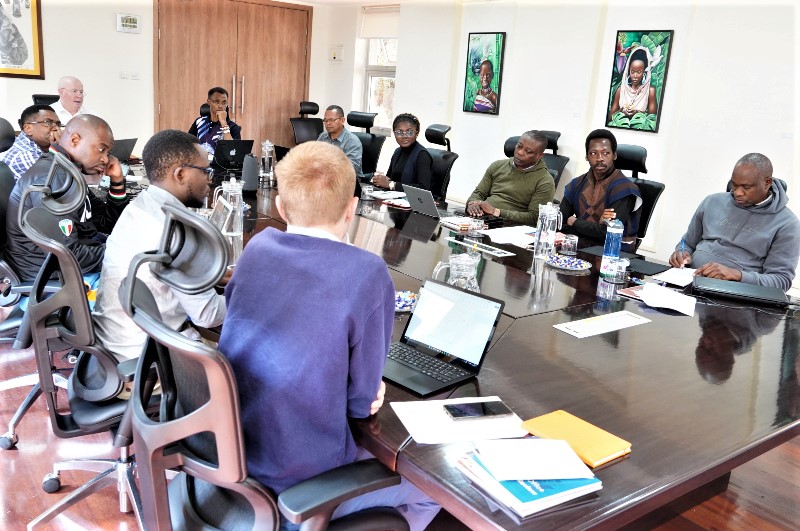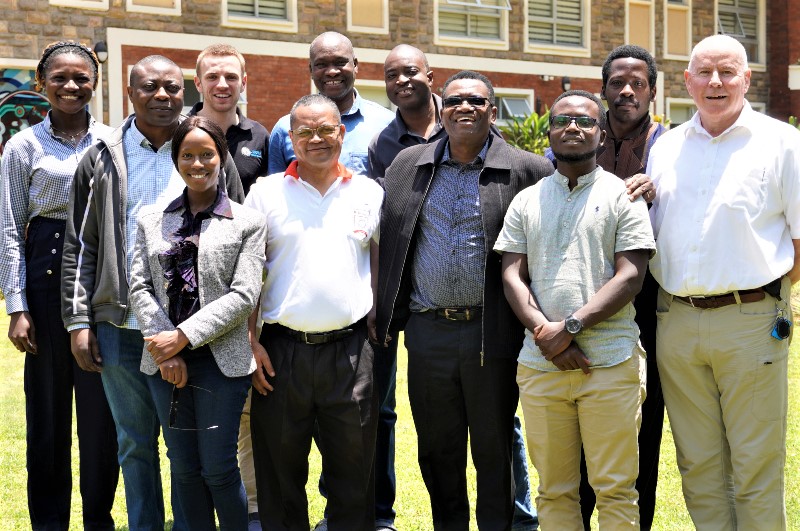

October 3-7, the Jesuit Development Officers of Africa and Madagascar (JEDOAM) resumed their annual meeting after two and half years following disruptions from the COVID-19 pandemic.
The meeting was held at Africama House, the Jesuit Conference of Africa, and Madagascar headquarters in Nairobi, Kenya. JEDOAM is a culmination of Jesuits and collaborators from the development and communications offices of the five provinces and one region, mainly to share their experiences, and ideas and create new ways of collaboration and networking towards advancing the mission of the Society of Jesus in Africa. This year though, only the development directors met, joined by the JCAM Communications Coordinator who gave a session on digital tools for fundraising. Generally, the meeting was facilitated by the Development Director, Fr. Paul Hamill, SJ.
In attendance were: Fr. Kevin Maria Odey, SJ, and Ms. Chidera Nwile from Africa North-West Province(ANW); Victor Manirakiza, SJ, and Gregoire Baisle from Rwanda-Burundi Region (RWB); Fr. Admire Nhika, SJ, and Norbert Tembo from Southern Africa Province (SAP); Fr. Pascal Rumb Musans, SJ, from Central Africa Province (ACE); Victor Tito, SJ, from West Africa Province (AOC); and Fr. Alexis Rakotozanany, SJ, from Madagascar Province (MDG).
Given the importance of the development apostolate in the work of the provinces and region, this forum was steered towards not only sharing what has, been or is being done, at the local level but also exploring the areas of need with a specific focus on fundraising at a time when international donor funds continue to dwindle, and the unpredictable and changing trends in the world due to many factors including wars, and economic slumps across the globe.
The one distinguishing factor in this gathering was that there was a lot of enthusiasm from all participants despite the various prevailing needs and challenges that they continue to face in their various offices. The meeting adopted a conversational model, held in both smaller and larger groups. These guided conversations were geared toward specific goals and outcomes. Some were centered around fundraising efforts locally and internationally (lessons and challenges), collaboration at different levels (intra-province, inter-province, intra-province, and inter-conference), capacity building, and communications for development (fundraising in a digital environment, tools for digital fundraising).
Throughout these conversations, there was an emerging theme of creating partnerships and relationships just like St. Ignatius. Participants were encouraged to make it about the mission and bring in people to share in the mission of the Society of Jesus at large. There was also an emphasis on formation around development and communications for development within novitiates, and formation houses: A need to develop stories, create reliable contacts for liaison purposes at the various apostolates and ministries, recognize the importance of Jesuits within our local contexts who have expertise in various subjects and engage them to become part of the knowledge replication to scholastics or novices within the provinces in the areas of development and communications for development.
The importance of collaboration among provinces and one region to avoid isolation (working in silos), and to ease duplication of development projects, was also underpinned. The sustainability of projects was also highlighted. In order to thrive in a world of disruptions, participants were urged to diversify their fundraising efforts, by reaching out to local donors and looking at existing resources, and seeing how they can generate funds (creating projects that pay for themselves in the long term).
On the last day, the JCAM President, Agbonkhianmeghe Orobator, SJ, joined the afternoon session. He addressed participants challenging them to cultivate mutual relationships embodied in gratitude. He also reminded them that the mission comes first “the mission of the Society of Jesus is to help souls”. He emphasised that the work being done is an advancement of this mission and that it is never wasted time - that leaving people better than we found them, is development in itself. Fr. Orobator, SJ, also encouraged participants to never find fault at not getting that 100% but rather celebrate the milestones, the challenges, or failures along the way, as a mode of benchmarking (a way to tell and retell stories of what worked, what fell short - to learn mutually). Communication as an integral part of development work was also highlighted as key. Participants were challenged to find new ways of exploring and learning about the various tools and aspects of communications, see how they contribute to the development work and be of use to the mission of the Society of Jesus. Most importantly, the JCAM President said that participants should stay in touch with their Major Superiors not only by way of informing them on the work being done but also forming them - to understand the work of development because not all have that understanding or have a background in development.
The meeting closed with a Q&A and an evaluation thereafter.
Related Articles
Select Payment Method
Pay by bank transfer
If you wish to make a donation by direct bank transfer please contact Fr Paul Hamill SJ treasurer@jesuits.africa. Fr Paul will get in touch with you about the best method of transfer for you and share account details with you. Donations can be one-off gifts or of any frequency; for example, you might wish to become a regular monthly donor of small amounts; that sort of reliable income can allow for very welcome forward planning in the development of the Society’s works in Africa and Madagascar.
Often it is easier to send a donation to an office within your own country and Fr Paul can advise on how that might be done. In some countries this kind of giving can also be recognised for tax relief and the necessary receipts will be issued.


